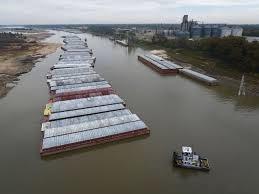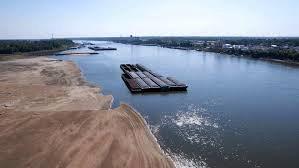 The National Oceanic and Atmospheric Administration (NOAA) predicts a third consecutive year of hot and dry weather in the Mississippi River Basin. For the past two years, low water level has impeded barge shipment along the Mississippi River system. For a few weeks during 2022, 100 towboats and 2,000 barges were idled as a result of low water level. This was followed by a similar period of reduced traffic during late August through September 2023. Less volume transported as a result of limiting passage raises freight rates. This directly places competitors of the U.S. including Brazil and Argentine at an advantage, impacting the volume of U.S. exports. Increased freight rates are reflected in higher feed costs for broiler and egg producers in the Southeast since there is reliance on barge transport for major ingredients. Alternatives including road and rail freight are unable to compensate for delays and restrictions on the Mississippi waterway.
The National Oceanic and Atmospheric Administration (NOAA) predicts a third consecutive year of hot and dry weather in the Mississippi River Basin. For the past two years, low water level has impeded barge shipment along the Mississippi River system. For a few weeks during 2022, 100 towboats and 2,000 barges were idled as a result of low water level. This was followed by a similar period of reduced traffic during late August through September 2023. Less volume transported as a result of limiting passage raises freight rates. This directly places competitors of the U.S. including Brazil and Argentine at an advantage, impacting the volume of U.S. exports. Increased freight rates are reflected in higher feed costs for broiler and egg producers in the Southeast since there is reliance on barge transport for major ingredients. Alternatives including road and rail freight are unable to compensate for delays and restrictions on the Mississippi waterway.

Under the bipartisan infrastructure law, funding has been allocated to improved bulk terminal grain storage and handling. Dredging channels and upgrading of locks is in progress after neglect for decades. Notwithstanding improvements, the entire transport system is reliant on an adequate water level that is in turn determined by rainfall and melting of snowpack in the Mississippi catchment area.